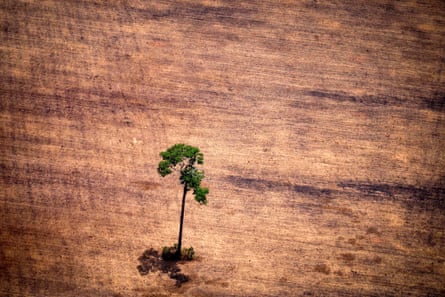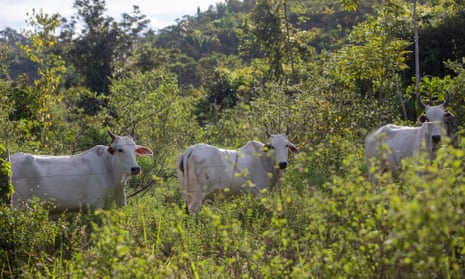Norway has followed Germany in suspending donations to the Brazilian government’s Amazon Fund after a surge in deforestation in the South American rainforest. The move has triggered a caustic attack from the country’s rightwing president.
Jair Bolsonaro, whose move to meddle in the environmental organisation’s governance led to Norway’s decision, reacted by suggesting that Europe was not in a position to lecture his administration.
“Isn’t Norway that country that kills whales up there in the north pole?”, the Brazilian president said. “Take that money and help Angela Merkel reforest Germany.”
After weeks of tense negotiations with Norway and Germany, the Bolsonaro government unilaterally closed the Amazon Fund’s steering committee on Thursday. The fund has been central to international efforts to curb deforestation although its impact is contested.
Brazil’s environment minister, Ricardo Salles, said the Amazon Fund had been suspended while its rules were under discussion.
In response, Ola Elvestuen, his Norwegian counterpart, said an expected payment of about $33.27m (£27.36m) would not take place as Brazil had, in effect, broken the terms of its deal. Norway has been the fund’s biggest donor, and has given about $1.2bn (£985m) over the past decade.
“He cannot do that without Norway and Germany’s agreement,” Elvestuen said. “What Brazil has shown is that it no longer wants to stop deforestation.”
This week Berlin had said it would withhold an expected payment of about $39m. Norway and Germany questioned an initial proposal from the Brazilian government for the fund’s steering committee to be reduced in size, and had warned against any weakening of the structures of the fund.
Grave concerns about the rate of deforestation since Bolsonaro took power have been repeatedly voiced by the Norwegian government and others.
According to Brazil’s National Institute for Space Research, the government agency that monitors deforestation, the rate increased by 278% in the year to July, resulting in the destruction of about 870 square miles.

Bolsanaro has dismissed the figures, insisting the country “will truly take off once we manage to sensibly extract the riches” in the rainforest, of which 60% is in Brazil.
The surge of destruction has continued. Last Saturday, farmers in the Amazon declared a “fire day” and coordinated a massive burnoff of trees to clear land for crops. According to the Folha de São Paulo newspaper, they felt encouraged to take this action because the president had signalled his willingness to open up previously protected land.
Near Altamira, the number of fires increased last weekend by more than 900% over the previous worst day this year. In Novo Progresso, the rise was by more than 500%. The forest protection agency, Ibama, has reportedly had to halt operations in Novo Progresso because it no longer has the full backing of the police and national guard.
The former army captain was elected with the support of the mining and agricultural sectors. During a visit to the Amazon last year, he told the Guardian that as president he would target “cowardly” environmental NGOs who were “sticking their noses” into Brazil’s domestic affairs.
But the new government’s attitude to the Amazon could have wider repercussions. In June, a free trade deal was struck between the EU and Argentina, Brazil, Paraguay and Uruguay, known as the Mercosur bloc.
Green campaigners claim the deal pays “lip service” to international goals to combat climate warming, and that it will lead to a surge in Brazilian cattle ranching, which many believe is responsible for growing levels of deforestation.
The trade deal will require ratification by the parliaments of its member states as well as the European parliament.
Last month the Irish parliament backed a symbolic motion instructing the government to “immediately begin building a coalition across the EU to ensure that this deal is rejected”. The motion highlighted concerns about the growing damage to the Amazon.
